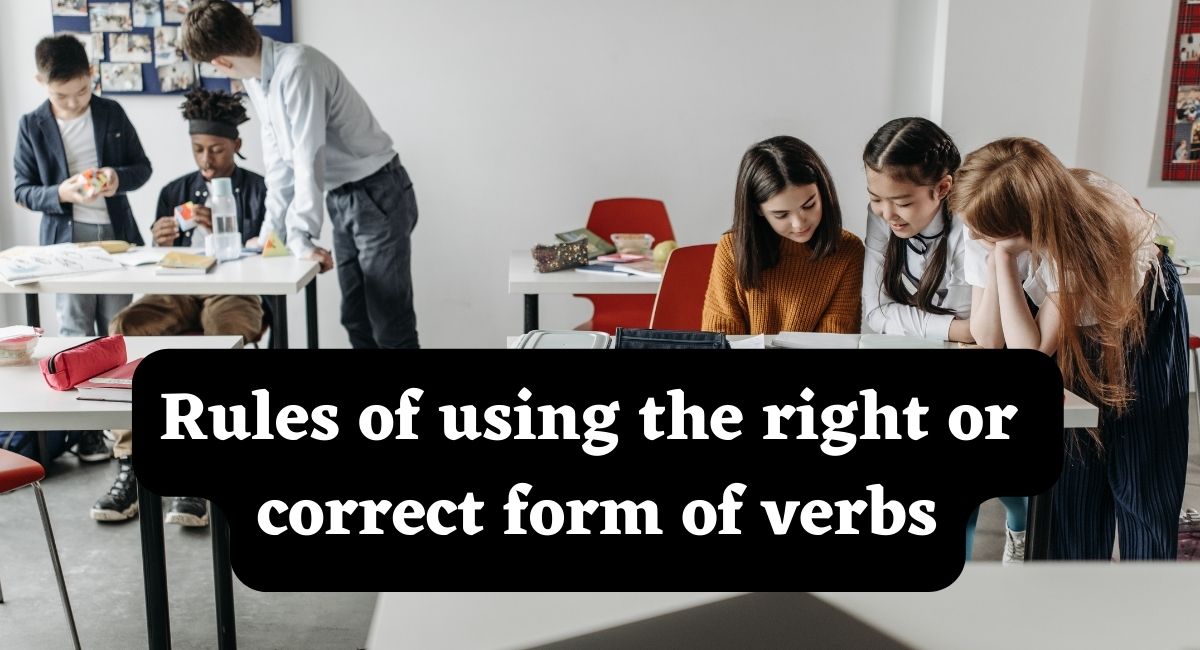Rules of using the right or correct form of verbs Part -4
The right form of verbs is one of the most important parts of English grammar. Those who have a good idea about tense will find this chapter very simple. This is one of the most important sections for all class English 2nd papers. You who are SSC and HSC candidates must memorize these rules. It will be useful in all your exams.
31. If-যুক্ত clause-এর প্রথম অংশ Past perfect tense হলে পরের অংশে subject-এর পরে would have/could have/might have বসে এবং verb-এর Past participle form হয়।
যেমন:
- If you had finished it sincerely, you (get) a profit.
- Ans.: If you had finished it sincerely, you would have got a profit.
- If I had possessed vast wealth, I (help) the poor people.
- Ans.: If I had possessed vast wealth, I would have helped the poor people.
32. To ব্যাতিত preposition-এর পরের verb-এর সঙ্গে ing যুক্ত হয়।
যেমন:
- He is now engaged in (read).
- Ans.: He is now engaged in reading.
- One can gather knowledge by (travel).
- Ans.: One can gather knowledge by travelling.
33. Can not help, could not help, look forward to, with a view to, get used to, mind ইত্যাদির পরে verb-এর সঙ্গে ing যুক্ত হয়।
যেমন:
He came to Dhaka with a view to (find) a job.
Ans.: He came to Dhaka with a view to finding a job.
I cannot help (laugh).
Ans.: I cannot help laughing.
34. কোনো sentence-এর শুরুতে subject-এর স্থানে verb থাকলে verb-এর সঙ্গে ing যোগ হয়।
যেমন:
- (To swim) is a good exercise.
- Ans.: Swimming is a good exercise.
- (To speak) is an art.
- Ans.: Speaking is an art.
35. If-যুক্ত clause-এর প্রথমটিতে subject-এর পর were থাকলে দ্বিতীয় অংশে subject-এর পরে would/could/ might বসে এবং verb-এর Present from বসে। আবার, would have/could have/would have-ও বসতে পারে। সে ক্ষেত্রে verb-এর Past participle form বসে।
যেমন:
- If I were an artist, I (draw) a nice picture.
- Ans: If I were a artist, I would draw a nice picture.
- If I were a billionaire, I (establish) a hospital for the poor.
- Ans.: If I were a billionaire, I would establish a hospital for the poor.
36. Had-এর পরে subject এবং verb-এর Past participle থাকলে পরবর্তী clause-এর subject-এর পরে would have/could have/might have + verb-এর Past participle form বসে।
যেমন:
Had I been a teacher, I (talk) the real story to my students.
Ans.: Had I been a teacher, I would have talked the real story to my students.
37. Verb ‘to be’-বিহীন sentence-কে negative বা interrogative করতে হলে tense ও subject-এর number ও person অনুসারে do, does, did ব্যবহার করতে হবে।
যেমন:
- We not (play) Ha-du-du.
- Ans.: We do not play Ha-du-du.
- She not (play) football.
- Ans.: She does not play football.
38. সাধারণত preposition—on, in of, for, from, by, after at, beyond, upon, against, with, without, before ইত্যাদি—এর পরে verb-এর সঙ্গে ing যোগ হয়।
যেমন:
- Rina is busy in (do) her homework.
- Ans.: Rina is busy in doing her homework.
- Keep on (try) hard.
- Ans.: Keep on trying hard.
39. Interrogative sentence যদি who, what, why, which, when, where, whose, how ইত্যাদি question word দ্বারা শুরু হয়, তাহলে subject-এর আগে tense ও person অনুযায়ী auxiliary verb ব্যবহার করতে হবে।
যেমন:
- Why he (look) so happy?
- Ans.: Why does he look so happy?
- When father (come)?
- Ans.: When will father come?
40. সাধারণত নিচে লিখিত verb-গুলোর পরে gerund বসে। যেমন: admit, enjoy, report, appreciate, finish, recent, avoid, mind, resist, miss, resume, consider, postpone, risk, delay, practice, suggest, escape, imagine, save, recall, prevent, propose, stop, deny, quit ইত্যাদি।
যেমন:
- We enjoy (watch) TV.
- Ans.: We enjoy watching TV.
- I have finished (writing).
- Ans.: I have finished writing.
41. Point of time (নির্দিষ্ট সময়) বোঝালে since এবং period of time (অনির্দিষ্ট সময়) বোঝালে for বসে। এ ক্ষেত্রে present perfect continuous tense হবে।
Example
- He (read) — the book for two hours.
- Ans. He has been reading the book for two hours.
- It (rain) — since morning.
- Ans. It has been raining since morning.
42. As well as, with, accompanied with, along with, together with, in addition to ইত্যাদি দিয়ে দুটি subject যুক্ত হলে প্রথম subject অনুযায়ী verb বসে।
Example:
- Becon as well as Shakespeare (be) — dead.
- Ans. Becon as well as Shakespeare was dead.
- My sister accompanied with Zilan will (to have) — a test tomorrow.
- Ans. My sister accompanied with Zilan will have a test tomorrow.
- They together with me (to help) — the poor.
- Ans. They together with me help the poor.

